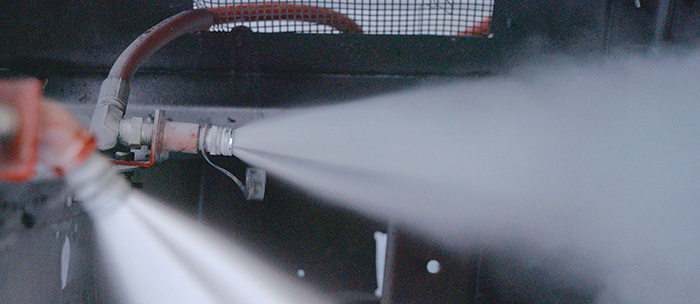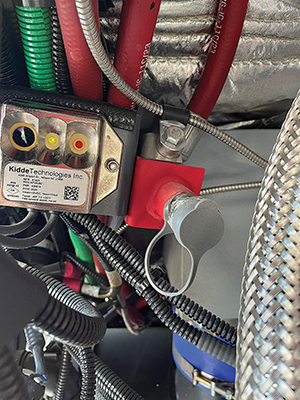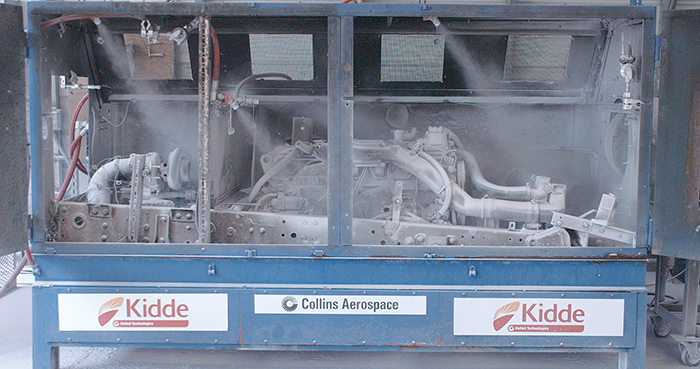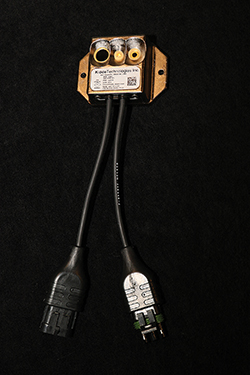
Julio Ortiz, senior director of maintenance for the Regional Transportation Commission of Southern Nevada (RTC), has experience with high-tech fire suppression technology.
 In his previous position as director of maintenance for the San Diego Metropolitan Transit System (MTS) – where he worked for more than 34 years before retiring – Ortiz was part of an agency-wide overhaul of fire suppression systems. In this deployment (which was a result of several high-profile bus fires) MTS outfitted its bus fleet with Kidde systems featuring fire-detecting optical sensors. After testing the systems, Ortiz said, the agency opted to mandate optical sensors into all new fire suppression installations.
In his previous position as director of maintenance for the San Diego Metropolitan Transit System (MTS) – where he worked for more than 34 years before retiring – Ortiz was part of an agency-wide overhaul of fire suppression systems. In this deployment (which was a result of several high-profile bus fires) MTS outfitted its bus fleet with Kidde systems featuring fire-detecting optical sensors. After testing the systems, Ortiz said, the agency opted to mandate optical sensors into all new fire suppression installations.
Fast forward to 2017 when Ortiz returned from retirement to work for RTC in Nevada. He said he was relieved to find that RTC – which had learned the same lessons on fire safety as MTS – was already using Kidde’s patented optical detectors for more than a decade.
“We have a huge responsibility for safety here at RTC,” Ortiz said. “Our contractors Keolis and MV Transportation provide transportation every day for our locals and visitors, but it is the maintenance department’s job to oversee our fleet of more than 800 buses. All those vehicles are equipped with fire suppression and methane detection systems as well as Kidde’s dual-band optical sensors.”
Fire-Detecting Optical Sensors
The Kidde system used by RTC is a fully automatic fire suppression system. The system features strategically-placed sensors in the engine area which are capable of detecting a fire in less than 0.2 seconds. When the system detects a fire, it floods the engine area with an environmentally-friendly dry powdered agent which snuffs the fire and prevents reignition.
“The optical sensor is a unique piece of Kidde-patented technology,” said Matthew Clapp, OEM account manager at Kidde Technologies. “It actually ‘sees’ and recognizes flames in less than a second – really, in less than the blink of an eye. The faster you recognize the fire, then the more time you have to evacuate the bus. Furthermore, you are allowed more time to extinguish the fire and preserve the vehicle.”
Developed for the United States military, this “smart eye” is a resettable sensor with an LED status monitor for easy confirmation of system operability. Ortiz said the reaction time of optical sensors is a major benefit to RTC and other agencies.
“Reaction time saves you from big problems,” he said. “I want to reduce the amount of damage done to a vehicle before the system activates. In that sense, an optical sensor can mean the difference between a small fire event and a bus going down from a major fire.”

Choosing the Right System
Ortiz said that product quality and aftermarket support are the top two criteria for transit agencies selecting new fire suppression systems. The onboard dual-band optical sensors represent state-of-the-art fire detection technology, and the agency is pleased with the system’s efficacy.
When it comes to aftermarket support, the relationship between RTC and Thermal Protection Services (TPS) is vital. TPS is the only authorized distributor of Kidde Technologies Commercial Ground Vehicles genuine parts, field service, technical and warranty support, and customer training in North America – and the company’s Southern California location makes it a perfect support partner for RTC in Las Vegas.
“The support which TPS puts behind Kidde’s technology is a major reason why it works so well for us,” Ortiz said. “Without proper support, a fire detection and suppression system can become very weak over time.”
TPS launched in 2013 after parent company Vehicle Technical Consultants (VTC) was successfully conducting fleet audits, inspecting, and testing onboard safety systems for transit agencies, motorcoach companies, and school bus operations. Kidde was impressed with the company’s work, considering it a form of product support. The relationship evolved to the point where TPS signed a North American contract with Kidde Technologies Commercial Ground Vehicles in 2017.
“When we came into the situation, Las Vegas was already using Kidde systems,” said Jerry Farrar, owner of TPS. “Our ability to quickly support them has allowed the agency to grow with Kidde. They have looked at other systems – as you should. That they have stayed strictly with Kidde’s systems is a testament to the technology as well as the agency’s commitment to safety.”

System Deployment
When Kidde and TPS begin working with an agency like RTC, responsible for maintaining hundreds of vehicles, the first step is always determining need.
“The genesis of a deployment is always a need which an agency must address,” Clapp said. “We will typically work with an agency to make sure we have technology fit to address that need. From that point forward, much is handled in the RFP process between us, the agency, and the bus manufacturer. There is a lot of integration required with factory-installed fire suppression systems, so I work to help coordinate all of those moving parts.”
Ortiz added that fire suppression deployments are highly situational based on the fleet size and makeup of an agency. He also stressed the important of having a designated maintenance plan for a new system, including a strong training plan for new technicians.
“We also make sure to coordinate with bus drivers, so that have awareness of potential issues that can occur during bus fires,” Ortiz said. “It can be embarrassing to have a bus burn, and it is critical the drivers are on-board with any nuances in a new system.”
For TPS, the deployment process begins in the Kidde engineering department. From there, Farrar said, TPS has inspectors at the Kidde factory for prototype development. The company is present for the system’s layout and build, as well as the first installation. Farrar said that this provides TPS with the knowledge required for supporting large fleets like RTC.
“We make sure the system is installed properly, and we have representatives on-site when the system is delivered to an agency’s property,” he said. “Our people check the system regularly to ensure it has the right responsiveness – and we will do that for any Kidde customer.”
Farrar added that, up to once per year, TPS can conduct complete on-site system checks on fleets of all sizes at no cost.

System Maintenance and Support
The system which RTC uses had a recommended biannual maintenance interval.
“Preventative maintenance is first and foremost in proactive fire safety,” said Matt Szymanski, director of operations at TPS. “Oil leaks, exhaust leaks, or loose belts and hoses – all can be contributors to a vehicle fire. If you stay on top of PM, then you can feel confident in the remote monitoring and detection found in the fire suppression system – which only require a six-month visual inspection and six-year bottle service.”
Szymanski said that the biannual inspection involves a visual check (ensuring that the system is properly secured), as well as simple test procedures for optical and gas sensors.
“Mainly, we are checking to make sure sensors and nozzles are clean and unobstructed,” he said. “Other than that, we are mostly looking at normal preventative maintenance.”
A True Partnership
With Kidde and TPS’ involvement from the factory to installation, the RTC fire suppression system represents a collaborative partnership between manufacturer, agency, and support provider. It is a hands-on working relationship, which Ortiz said RTC greatly values.
“The Kidde technology is great, and the support from TPS is so valuable,” he said. “When I call TPS for a problem, they say ‘OK,’ and someone is on our property within three or four hours. It allows us to feel comfortable in these stressful situations, because no agency wants to encounter a bus fire.”
Clapp added that Kidde has been very fortunate to have a partner like RTC, an agency which has grown and embraced new fire detection and suppression technologies. He said that RTC has also been important in helping Kidde develop new products based on the agency’s needs.
“It is a partnership from multiple angles,” he added. “As we grow in our technology developments, the agency is also able to troubleshoot issues quicker and reduce downtime. We are really fortunate to have a true partnership with RTC, Julio, and the RTC maintenance department.”
For more information on Kidde products and services, please visit thermalprotectionservices.com or call 833-433-FIRE (3473)
